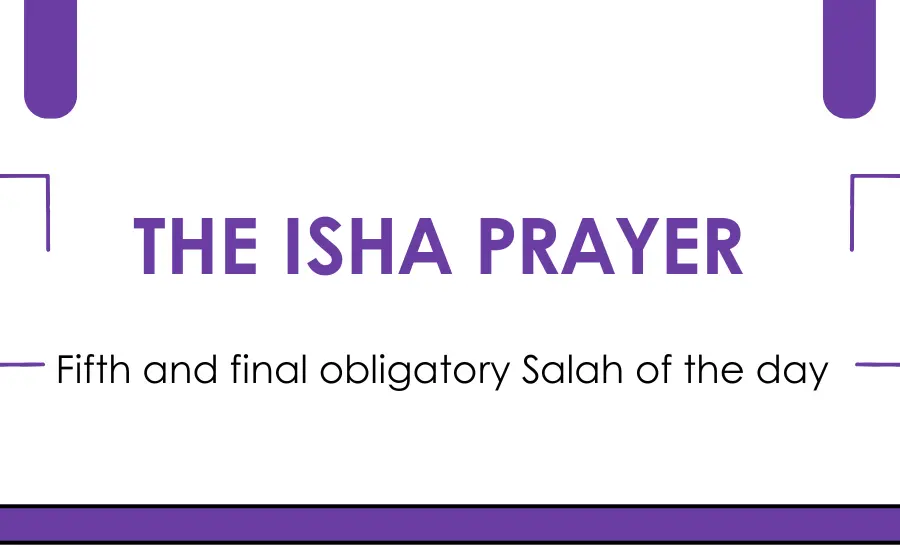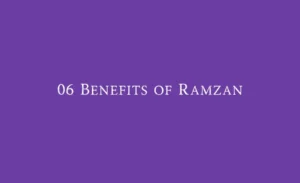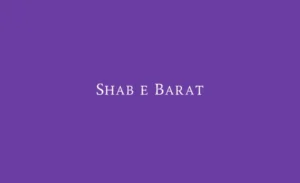The Isha prayer is the fifth and final obligatory Salah of the day. It marks the end of a believer’s daily journey of worship, serving as a time for reflection, peace, and connection with Allah before resting for the night. After a day filled with work, challenges, and responsibilities, Isha comes as a spiritual retreat, wrapping the believer in calmness and forgiveness.
This prayer symbolizes the closure of the day, reminding us that just as the night covers the world in darkness, a Muslim must seek Allah’s light through prayer and remembrance. The Prophet Muhammad (peace be upon him) described those who perform Isha and Fajr in congregation as people of true faith and reward.
وَمِنَ اللَّيْلِ فَتَهَجَّدْ بِهِ نَافِلَةً لَّكَ عَسَىٰ أَن يَبْعَثَكَ رَبُّكَ مَقَامًا مَّحْمُودًا
Transliteration: Wa minal layli fatahajjad bihi nafilatan laka asa an yab’athaka rabbuka maqaman mahmooda.
Translation: “And during a part of the night, pray Tahajjud as an extra prayer for yourself. It may be that your Lord will raise you to a praised station.” – (Surah Al-Isra 17:79)
This ayah highlights the spiritual elevation that comes through night worship, starting with Isha and extending to Tahajjud.
Meaning and Timing of Isha Prayer
The word Isha means “night,” referring to the darkness after twilight has completely disappeared. The Isha prayer time begins when the red twilight (shafaq) disappears and continues until midnight.
It is preferred to pray Isha early, but it can be delayed until before Fajr if one has a valid reason. The Prophet (PBUH) said:
لَوْ يَعْلَمُونَ مَا فِي الْعَتَمَةِ وَالصُّبْحِ لَأَتَوْهُمَا وَلَوْ حَبْوًا
Transliteration: Law ya’lamoona ma fil ‘atamati was-subh la’atawhuma walaw habwa.
Translation: “If people knew the reward for praying Isha and Fajr in congregation, they would come to them even if they had to crawl.” – (Sahih Bukhari 7224, Sahih Muslim 437)
This shows the immense value Allah places on performing Isha Salah, especially in congregation.
Total Rakats of Isha Salah
The Isha prayer consists of 17 rakats in total:
- 4 Sunnah (Ghair Mu’akkadah optional but recommended)
- 4 Fard (obligatory)
- 2 Sunnah (Mu’akkadah highly recommended)
- 2 Nafl (voluntary)
- 3 Witr (obligatory in many schools, especially Hanafi)
- 2 Nafl (optional)
Thus, a complete Isha prayer includes both obligatory and voluntary acts, offering spiritual enrichment and closeness to Allah.
Virtues and Rewards of Isha Salah
The Isha prayer carries numerous virtues that benefit the soul and bring divine protection:
1. Equivalent to Night Worship
مَنْ صَلَّى الْعِشَاءَ فِي جَمَاعَةٍ فَكَأَنَّمَا قَامَ نِصْفَ اللَّيْلِ، وَمَنْ صَلَّى الصُّبْحَ فِي جَمَاعَةٍ فَكَأَنَّمَا صَلَّى اللَّيْلَ كُلَّهُ
Transliteration: Man salla al-isha fi jama’atin faka’annama qama nisfa al-layl, wa man salla as-subha fi jama’atin faka’annama salla al-layla kullahu.
Translation: “Whoever prays Isha in congregation, it is as if he has prayed half the night; and whoever prays Fajr in congregation, it is as if he has prayed the whole night.” (Sahih Muslim 656)
This shows that Isha holds the reward of extended worship, even if one only prays it on time.
2. Protection and Forgiveness
Praying Isha sincerely wipes away sins committed during the day and brings divine protection throughout the night. The Prophet (PBUH) said:
بَشِّرِ الْمَشَّائِينَ فِي الظُّلَمِ إِلَى الْمَسَاجِدِ بِالنُّورِ التَّامِّ يَوْمَ الْقِيَامَةِ
Transliteration: Bashshir al-mashsha’ina fi dhulum ila al-masajid bin noor at-taam yawmal qiyamah.
Translation: “Give glad tidings to those who walk to the mosques in darkness (for Isha and Fajr) that they will have perfect light on the Day of Judgment.” – (Sunan Abu Dawood 561)
The believer who walks to pray Isha at night will be rewarded with divine light in the Hereafter.
3. Peace and Restfulness before Sleep
Like all prayers, the Isha prayer cleanses the heart and mind before one sleeps, ensuring the night begins with a remembrance of Allah. The Prophet (PBUH) disliked sleeping before Isha and discouraged engaging in worldly talk after it, emphasizing that this time should be spent in worship, reflection, or rest.
Praying Isha and Maghrib Together (In Special Circumstances)
Islam offers flexibility and ease. The Prophet Muhammad (PBUH) at times combined Maghrib and Isha when traveling or during hardship.
كَانَ النَّبِيُّ صَلَّى اللَّهُ عَلَيْهِ وَسَلَّمَ يَجْمَعُ بَيْنَ الْمَغْرِبِ وَالْعِشَاءِ فِي السَّفَرِ
Transliteration: Kana an-Nabiyyu sallallahu alayhi wa sallam yajma’u baynal maghribi wal isha fis-safar.
Translation: “The Prophet (PBUH) used to combine Maghrib and Isha prayers while traveling.” (Sahih Bukhari 1102, Sahih Muslim 705)
Therefore, if one faces unavoidable difficulty such as illness, travel, or severe weather, it is permitted to combine Maghrib and Isha together.
Congregational Isha Prayer (Salat al-Jama’ah)
Praying Isha in congregation (Jama’ah) holds great virtue and reward in Islam. It is one of the most beloved acts to Allah, especially because it requires effort and sincerity i.e. coming to the masjid at a time when most people prefer to rest. Performing Isha in congregation not only multiplies reward but also earns the believer a share in the reward of praying half the night.
Hadith on the Virtue of Isha in Congregation
مَنْ صَلَّى الْعِشَاءَ فِي جَمَاعَةٍ فَكَأَنَّمَا قَامَ نِصْفَ اللَّيْلِ، وَمَنْ صَلَّى الصُّبْحَ فِي جَمَاعَةٍ فَكَأَنَّمَا صَلَّى اللَّيْلَ كُلَّهُ
Transliteration: Man salla al-isha fi jama’ah fa ka’annama qama nisf al-layl, wa man salla as-subh fi jama’ah fa ka’annama salla al-layla kullah.
Translation: “Whoever prays Isha in congregation, it is as if he has stood in prayer for half the night; and whoever prays Fajr in congregation, it is as if he has prayed the whole night.” – (Sahih Muslim 656)
This hadith highlights how valuable the Isha Salah is when performed in Jama’ah, offering an immense reward even for a short effort.
The Prophet’s Emphasis on Congregational Isha
The Prophet Muhammad (peace be upon him) was very consistent in performing Isha in congregation and encouraged others to do the same. Despite the late timing, he emphasized that attending Isha and Fajr prayers in the masjid reflects true faith (iman) and sincerity of heart.
Hadith: “The most burdensome prayers for the hypocrites are Isha and Fajr, and if they knew what is in them (of reward), they would come even if they had to crawl.” – (Sahih Bukhari 657)
This shows that attending Isha prayer in Jama’ah is not only an act of devotion but also a mark of strong belief and love for Allah.
Spiritual and Social Benefits of Isha in Congregation
The Isha congregational prayer is a test of sincerity, patience, and love for Allah. It’s an opportunity to earn the reward of half the night’s worship and end the day with divine peace. Whether in the masjid or at home with family, performing Isha in Jama’ah keeps one’s faith alive and heart connected to the Creator. It:
- Strengthens Faith and Sincerity: Praying Isha in Jama’ah demonstrates strong iman, as it requires one to fight sleep and worldly distractions for Allah’s sake.
- Earns Continuous Night Reward: Joining the congregation allows a believer to gain the reward of standing in prayer for half the night, even with just a few minutes of Salah.
- Brings Peace and Brotherhood: Gathering at night in the masjid fosters community spirit, love, and mutual support among Muslims.
- Protection and Tranquility for the Night: A person who ends their day with Isha in Jama’ah rests under Allah’s protection, free from worry and spiritual unrest.
For Those Unable to Attend the Masjid
If someone cannot reach the masjid due to distance, health, or genuine reasons, praying Isha in congregation at home with family is also highly rewarded. A husband leading his family in prayer strengthens spiritual unity and brings barakah (blessings) to the home.
Hadith: “When there are three men in a village or desert and they do not make the call to prayer and establish the congregation, Satan overcomes them. So stick to the congregation, for the wolf eats only the stray sheep.” – (Abu Dawood 547)
This powerful hadith reminds believers to stay connected to the congregation i.e.e whether in the masjid or at home, to remain protected from spiritual weakness and heedlessness.
Special Duas and Adhkar after Isha
After Isha, the Prophet (PBUH) encouraged remembrance (dhikr) and reflection. Recommended adhkar include:
- Ayat al-Kursi (Surah Al-Baqarah 2:255)
- Surah Al-Ikhlas, Al-Falaq, and An-Nas
- Tasbeeh Fatimah: SubhanAllah 33 times, Alhamdulillah 33 times & Allahu Akbar 34 times
The Prophet (PBUH) said:
“Whoever says these after every prayer will have his sins forgiven even if they are like the foam of the sea.” – (Sahih Muslim 597)
Connection between Isha and Tahajjud (Night Prayer)
Isha is the gateway to Tahajjud, the voluntary night prayer of deep devotion. After sleeping for a portion of the night, rising again for Tahajjud demonstrates sincerity and love for Allah.
تَتَجَافَى جُنُوبُهُمْ عَنِ الْمَضَاجِعِ يَدْعُونَ رَبَّهُمْ خَوْفًا وَطَمَعًا
Transliteration: Tatajafa junubuhum anil madaji’i yad’oona rabbahum khawfan wa tama’a.
Translation: “Their sides forsake their beds, calling upon their Lord in fear and hope.” (Surah As-Sajdah 32:16)
Performing Isha regularly strengthens the heart for Tahajjud and keeps the believer spiritually connected throughout the night.
Lessons and Reflections from Isha Prayer
The Isha prayer reminds believers to conclude their day with peace, reflection, and submission to Allah. It teaches patience, consistency, and gratitude, preparing the heart for rest and the soul for connection with the Creator. Through Isha, a Muslim strengthens faith, finds calmness in the night, and renews commitment to spiritual discipline.
- It teaches discipline by praying at the end of the day when rest tempts the believer.
- It promotes peaceful sleep, free from anxiety and heedlessness.
- It builds spiritual endurance, helping one prepare for Tahajjud and Fajr.
- It reminds us that the night is not for negligence but for seeking closeness to Allah.
The Prophet (PBUH) said:
“The best prayer after the obligatory ones is the night prayer.” – (Sahih Muslim 1163)
Common Mistakes to Avoid in Isha Prayer
Many Muslims unintentionally miss out on the blessings of Isha by delaying or neglecting it due to fatigue or distractions. The Prophet (PBUH) advised against postponing this prayer without reason and encouraged believers to rest after it, keeping the night for worship or tranquility. Consistency in Isha, along with Witr, ensures spiritual stability and divine protection through the night. You shouldn’t make the following mistakes:
- Delaying Isha unnecessarily without valid reason.
- Neglecting Witr, which the Prophet (PBUH) never abandoned.
- Engaging in idle talk or worldly entertainment after Isha instead of rest or dhikr.
- Skipping Isha due to tiredness, forgetting its great reward.
Conclusion: Ending the Day with Light and Forgiveness
The Isha Salah is more than the last prayer of the day, it is a moment of spiritual renewal and tranquility. Through Isha, a believer ends the day in obedience, securing Allah’s mercy before sleep. It prepares the soul for rest and the body for rejuvenation, ensuring that one’s final act of the day is remembrance of the Creator.
“The most beloved deeds to Allah are those done regularly, even if they are small.” – (Sahih Bukhari 6464)
So, make Isha Salah a daily habit, not just as a duty, but as a peaceful closure to your day and a key to success in this world and the next.
Frequently Asked Questions (FAQs) About Isha Prayer
What time does the Isha prayer start and end?
Isha prayer begins right after the disappearance of the red twilight (shafaq ahmar), which is approximately 15–20 minutes after Maghrib. Its time lasts until midnight (according to many scholars) or until Fajr (according to others). However, it is best to pray it earlier unless one is waiting to pray in congregation.
How many rakats are in Isha Salah?
The Isha prayer consists of 17 rakats in total i.e. 4 Sunnah, 4 Fard (obligatory), 2 Sunnah, 2 Nafl, 3 Witr (highly recommended and Sunnah Muakkadah), and 2 Nafl (optional after Witr). These prayers together complete the spiritual conclusion of the day.
Is Witr part of Isha prayer?
Yes, Witr Salah is performed after Isha and is considered Sunnah Muakkadah (highly emphasized). The Prophet Muhammad (peace be upon him) said:
“Witr is a duty upon every Muslim.” – (Abu Dawood 1416)
He never abandoned it, whether traveling or at home.
Can I combine Maghrib and Isha prayers?
Yes, combining Maghrib and Isha is allowed in cases of hardship, such as travel, illness, or severe weather. The Prophet (PBUH) combined them during journeys and on occasions when convenience was necessary. However, this should not become a regular practice without valid reason.
What is the best time to pray Isha?
The Prophet (PBUH) encouraged delaying Isha slightly (not too long) to a peaceful part of the night when one can pray with focus. However, praying in congregation at the masjid is the most virtuous time.
Hadith: “If they knew the reward of praying Isha and Fajr in congregation, they would come to them even if they had to crawl.” – (Sahih Bukhari 657)
Can I pray Tahajjud after Isha?
Yes, Tahajjud (the night prayer) is prayed after Isha and before Fajr. It is one of the most rewarding voluntary prayers, performed in the last third of the night. You may sleep after Isha and then wake up to perform Tahajjud, following the Sunnah of the Prophet (PBUH).
Is it permissible to sleep before praying Isha?
It is discouraged (makruh) to sleep before Isha unless one fears missing it. The Prophet (PBUH) disliked sleeping before Isha and engaging in unnecessary talk afterward. – (Sahih Bukhari 568)
The ideal routine is to pray Isha early, perform Witr, and then rest peacefully.
What happens if I miss the Isha prayer?
If someone misses Isha unintentionally (due to sleep or forgetfulness), they should pray it as soon as they remember. The Prophet (PBUH) said:
“Whoever forgets a prayer or sleeps through it, let him pray it when he remembers.” – (Sahih Bukhari 597)
However, deliberate neglect of Isha without excuse is a major sin and should be repented for immediately.
What are the benefits of praying Isha regularly?
Performing Isha consistently brings peace, forgiveness, and protection throughout the night. It strengthens discipline, brings tranquility to the soul, and prepares a believer for night worship like Tahajjud. It is also a sign of true faith, as only those who love Salah fight sleep to perform it.
Can women pray Isha at home?
Yes, women are encouraged to pray Isha at home, and their reward is equal to that of men who pray in the masjid. However, if they choose to attend the masjid with proper hijab and modesty, it is also permissible. The Prophet (PBUH) said:
“Do not prevent the female servants of Allah from going to the mosques of Allah.” – (Sahih Muslim 442)






